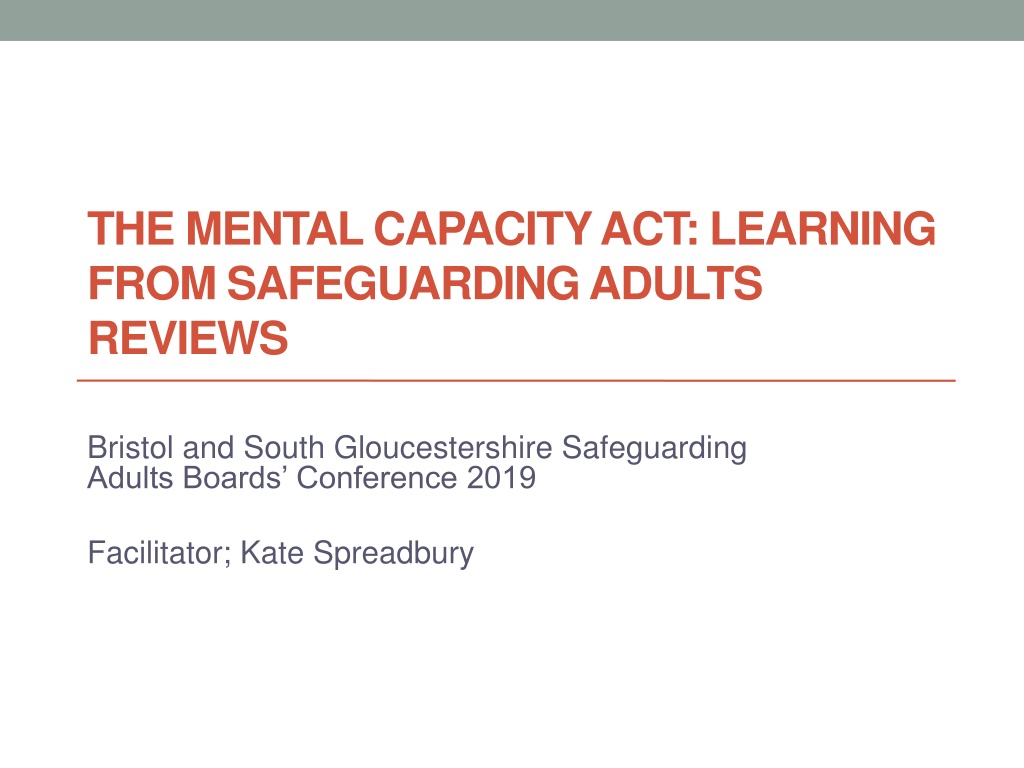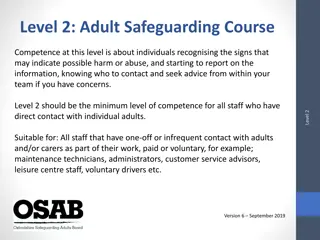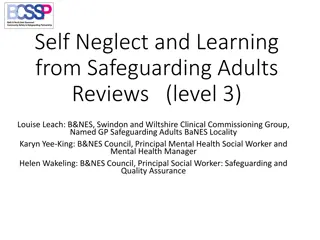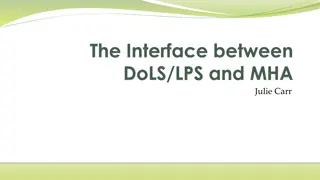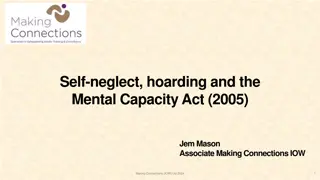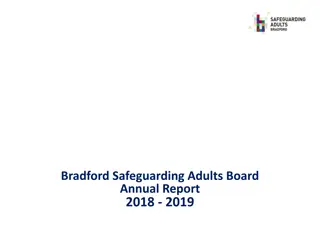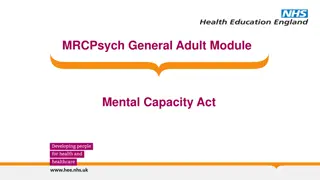Safeguarding Adults: Understanding the Mental Capacity Act
Explore the implications of the Mental Capacity Act (MCA) through SARs findings and thematic reviews. Gain insights into challenges in implementing the MCA, avoiding misleading uses, and understanding the duty of care. Learn about assessing capacity, identifying protective measures, and working effectively with vulnerable adults.
Download Presentation

Please find below an Image/Link to download the presentation.
The content on the website is provided AS IS for your information and personal use only. It may not be sold, licensed, or shared on other websites without obtaining consent from the author. Download presentation by click this link. If you encounter any issues during the download, it is possible that the publisher has removed the file from their server.
E N D
Presentation Transcript
THE MENTAL CAPACITY ACT: LEARNING FROM SAFEGUARDING ADULTS REVIEWS Bristol and South Gloucestershire Safeguarding Adults Boards Conference 2019 Facilitator; Kate Spreadbury
WELCOME We will explore the learning from a range of regional and national SARs about how the provisions of the MCA are understood and used.
By the end of the workshop Explore a range of circumstances that may impact on a person s capacity to make specific decisions and their ability to react to the consequences of those decisions. Identify some of the assumptions that are made about whether a person is making a capacitous decision Identify a range of considerations in addition to the MCA which need to be taken when working with an adult at risk who is being harmed or self- neglecting. Think through the impact of having capacity/not having capacity on further protective measures.
Thematic Reviews Braye and Preston Shoot London and South West SARs Evidence suggests that practitioners across health and welfare services continue to find MCA difficult to implement and understand (London) fundamental flaws in how MCA 2005 is understood and applied in practice across the south west (South West)
Misleading uses of the MCA 2005 Avoiding the over reliance on principle 1 - the presumption of capacity - this was highlighted by the House of Lords Select Committee (2014) - We were told of a worrying tendency among local authorities to use the presumption of capacity to avoid taking responsibility for a vulnerable person . In some cases the evidence suggests the principle has been deliberately misappropriated House of Lords post legislative scrutiny paragraph 63.
Adult Safeguarding and Capacity Honor: Swindon LSAB Case group members often referred to adults who had capacity' and apparently tolerated abuse as falling into the 'not safeguarding' category, meaning that enquiries would cease in this situation..
Duty of care The recent judgment in Southend-On-Sea Borough Council v Meyers [2019] is a stark reminder that reliance upon the presumption of capacity and the right of individuals to make unwise decisions[1]cannot, in and of itself, discharge public bodies of their safeguarding obligations, especially where they may be charged with the positive duty under Article 2 ECHR to take practicable steps to secure that person s life. Further than that, the judgment is a reminder that, especially where life is at risk, local authorities are under an obligation not merely to investigate, but also to take action, which may include seeking the authority of the court to carry out draconian interventions.
The right to make unwise decisions ]There is no such right, at least to be spelled out of the MCA: the MCA, rather, provides a person cannot be taken to be unable to make a decision merely because they make an unwise decision. That the decision is unwise may well be a trigger to investigating whether, in fact, they have capacity to make that decision.
How judgements that capacity can be assumed are made Honor was deemed to have capacity to make an unwise decision to rely on her son on the basis of conversations which did not include any consideration of the risks of so depending, or any consideration of the alternatives to tolerating abuse at any level. A key principle of the Mental Capacity Act is that a person only has full capacity if they have access to all the relevant information. This should be offered whether or not the person appears to want it at the time ..conclusions about capacity were reached on the basis of brief telephone calls between Honor and practitioners without any discussion of risks.
Presumption of capacity Tom: Somerset LSAB Tom made decisions which made him vulnerable to significant harm. For example, he was known to associate with individuals who targeted vulnerable adults. It was assumed that Tom had the mental capacity to decide to associate with exploitative individuals .
What affects people at a specific time? Ruth Mitchell, Plymouth SAB The impact of Ruth s mental health condition on her capacity to make decisions at that point, together with the impact of her cold environment and physical wellbeing on her ability to make decisions, should have been assessed.
Capacity and Capability Nottingham SAB: Mr. and Mrs. G This review has also raised an important distinction between capacity and capability and the tendency to confuse the two. Mental capacity is clearly defined in the Mental Capacity Act and refers to the cognitive ability to understand and make decisions. Capability has no legal definition and the word is not used in the Mental Capacity Act in any context, however on a day to day level the capability of a person to undertake tasks is taken as an indicator of the truthfulness or accuracy of the assessment of their capacity .
Decisional capacity reliance on verbal ability Bristol SAB : Mr. C Mr. C s mental capacity was formally assessed but despite his history of serious mental illness, and current behaviours and rationalisations, he was assumed to have capacity. The social worker assumed capacity on the basis of Mr. C s verbal reassurances
The complexity of individual circumstances: fluctuating capacity Mr I West Berkshire There was a unanimous view amongst professionals that Mr. I s capacity was retained in relation to key decisions about his health and welfare; however, the reality of his daily situation was that he was rarely sober enough to make informed day to day choices. There was a tendency by the Local Authority and Mental Health Trust Team to work with Mr. I as if he lacked capacity and required best interest decisions to be made on his behalf. This was probably because in relation to many day to day decisions, since he was not sober, Mr. I did lack capacity. However, capacity assessments were not undertaken to confirm this, and consequently there were no clear best interest care plans in place to support Mr. I or the care staff working with him.
Using past assessments/uncertainty about whose role it is to assess A formal capacity assessment undertaken by an agency not involved in Jane s day-to-day care and support over two years prior to her death became the assessment that most agencies referred to in the course of their decision-making around her living situation and care and support needs. Agencies therefore viewed Jane s non- engagement in the context of the previous assessment and determined she was making capacitated choices. A recommendation for a capacity assessment to resolve financial safeguarding concerns and the difference of opinion between two agencies was not undertaken. There appears to have been numerous occasions where there was an over-reliance on presumption of capacity. It is clear through interventions agencies had with Jane that there was a recognition that capacity assessments and potential Best Interest decisions were required. However, a reluctance to accept responsibility for undertaking these was informed by the misconception that this sat outside of their expertise B&NES SAB
Remember We are supporting a person to make decisions, taking all factors into account and taking steps to maximise their ability to make decisions and act upon them. This may mean using the provisions of the MCA to protect the rights of people who lack capacity to make a decision or set of decisions, i.e. decisions and actions are taken in the person s best interests and are the least restrictive possible, or it may be about understanding the capacitated person s circumstances, what has led them to make an unwise decision and how to work with them to prevent serious harm to themselves (or others).
The published SARs: Mr I: West Berkshire http://sabberkshirewest.co.uk/media/1202/sar-mr-i-final- report-2016v4.pdf Tom: Somerset https://ssab.safeguardingsomerset.org.uk/wp- content/uploads/Tom-SAR-Final-June-2016.pdf Honor:Swindon https://www.swindon.gov.uk/info/20011/adult_social_care_ and_support/763/swindon_local_safeguarding_adults_bo ard/4 Ruth Mitchell: Plymouth SAB http://files.uk2sitebuilder.com/e1/e5/e1e5b852-3727- 4d98-aa1e-7e261e6b6e96.pdf
The published SARs Nottingham SAB: Mr and Mrs G https://www.nottinghamshire.gov.uk/media/112270/sar- g15-overview-report.pdf Bristol SAB: Mr C: https://bristolsafeguarding.org/adults/safeguarding-adult- reviews/bristol-sars/mr-c-serious-case-review-october- 2016/ B&NES SAB: Jane https://www.safeguarding- bathnes.org.uk/sites/default/files/practitioner_briefing_- _sar_jane.pdf
References Preston-Shoot, M (2017) What difference does legislation make? Adult Safeguarding through the lens of serious case reviews and safeguarding adult reviews. A report for south west region safeguarding adults boards. https://ssab.safeguardingsomerset.org.uk/wp- content/uploads/SW-SCRs-SARs-Report-Final-Version- 2017.pdf Braye, S and Preston-Shoot, M (2017) Learning from SARs, A Report for London Safeguarding Adults Boards http://londonadass.org.uk/wp- content/uploads/2014/12/London-SARs-Report-Final- Version.pdf
